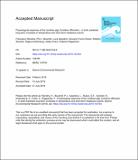Physiological response of the coralline alga Corallina officinalis L. to both predicted long-term increases in temperature and short-term heatwave events
Abstract
Climate change is leading to an increase of mean sea surface temperatures and extreme heat events. There is an urgent need to better understand the capabilities of marine macroalgae to adapt to these rapid changes. In this study, the responses of photosynthesis, respiration, and calcification to elevated temperature in a global warming scenario were investigated in the coralline alga Corallina officinalis. Algae were cultured for 7 weeks under 4 temperature treatments: (1) control under ambient-summer conditions (C, ∼20 °C), (2) simulating a one-week heatwave of 1 °C (HW, Tcontrol+1 °C), (3) elevated temperature (+3, Tcontrol +3 °C), (4) combination of the two previous treatments (HW+3, T+3+1 °C). After exposure at T+3 (up to a Tmax of ∼23 °C), respiration and photosynthesis increased significantly. After 5 weeks, calcification rates were higher at elevated temperatures (T+3 and THW+3) compared to Tcontrol, but at the end of the experiment (7 weeks) calcification decreased significantly at those temperatures beyond the thermal optimum (six-fold at T+3, and three-fold at THW+3, respectively). The same trend was noted for all the physiological processes, suggesting that a prolonged exposure to high temperatures (7 weeks up to T+3) negatively affect the physiology of C. officinalis, as a possible consequence of thermal stress. A one-week heatwave of +1 °C with respect to Tcontrol (at THW) did not affect respiration, photosynthesis, or calcification rates. Conversely, a heatwave of 1 °C, when combined with the 3 °C increase predicted by the end of the century (at THW+3), induced a reduction of physiological rates. Continued increases in both the intensity and frequency of heatwaves under anthropogenic climate change may lead to reduced growth and survival of primary producers such as C. officinalis.
Citation
Rendina , F , Bouchet , P J , Appolloni , L , Russo , G F , Sandulli , R , Kolzenburg , R , Putra , A & Ragazzola , F 2019 , ' Physiological response of the coralline alga Corallina officinalis L. to both predicted long-term increases in temperature and short-term heatwave events ' , Marine Environmental Research , vol. 150 , 104764 . https://doi.org/10.1016/j.marenvres.2019.104764
Publication
Marine Environmental Research
Status
Peer reviewed
ISSN
0141-1136Type
Journal article
Description
This work was supported by the European Cooperation in Science and Technology (COST) within the COST Action CA15121, advancing marine conservation in the European and contiguous seas (MarCons).Collections
Items in the St Andrews Research Repository are protected by copyright, with all rights reserved, unless otherwise indicated.

